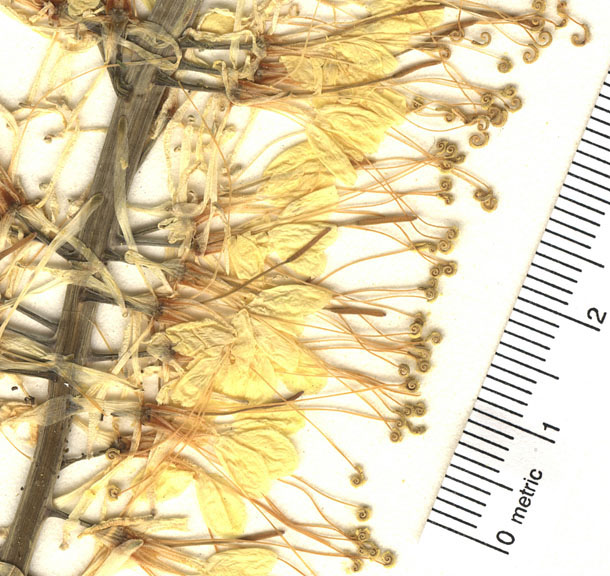
|
Family: Brassicaceae |
Annuals, perennials, shrubs, or subshrubs; (base usually woody); not scapose; glabrous or pubescent. Stems usually erect, rarely ascending, unbranched or branched. Leaves cauline and, sometimes, basal; petiolate or sessile; basal rosulate, petiolate, blade margins entire, lyrately lobed or 1- or 2-pinnatifid; cauline blade (base sometimes auriculate or amplexicaul), margins entire or dentate to pinnatifid. Racemes considerably elongated in fruit. Fruiting pedicels horizontal, divaricate, or divaricate-ascending, slender. Flowers: sepals spreading to reflexed, oblong-linear or linear, lateral pair not saccate basally; petals usually yellow or whitish, rarely white or yellow-orange, obovate, orbicular, oblong, linear, filiform, or oblanceolate, claw distinctly differentiated from blade (claw glabrous or papillose); stamens (exserted), equal; filaments not dilated basally, (often papillose basally); anthers linear, (strongly spirally coiled after dehiscence); lateral nectar glands annular, median present or absent, confluent with lateral ones. Fruits long-stipitate, linear, often torulose, terete or latiseptate; valves each with prominent midvein, glabrous; replum rounded; septum complete; ovules 22-70 per ovary; style obsolete or distinct (to 1.7 mm); stigma capitate, entire. Seeds uniseriate, plump, not winged, usually oblong, rarely ovoid; seed coat (obscurely reticulate), slightly mucilaginous when wetted; cotyledons accumbent to incumbent. x = 14. |
This project was made possible in part by the Institute of Museum and Library Services [MG-70-19-0057-19].
Powered by Symbiota



